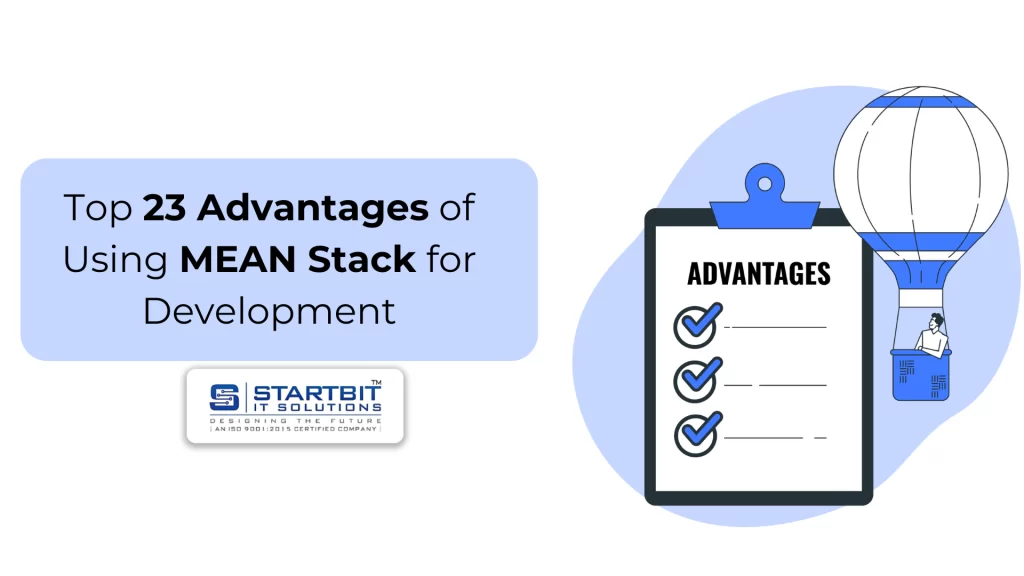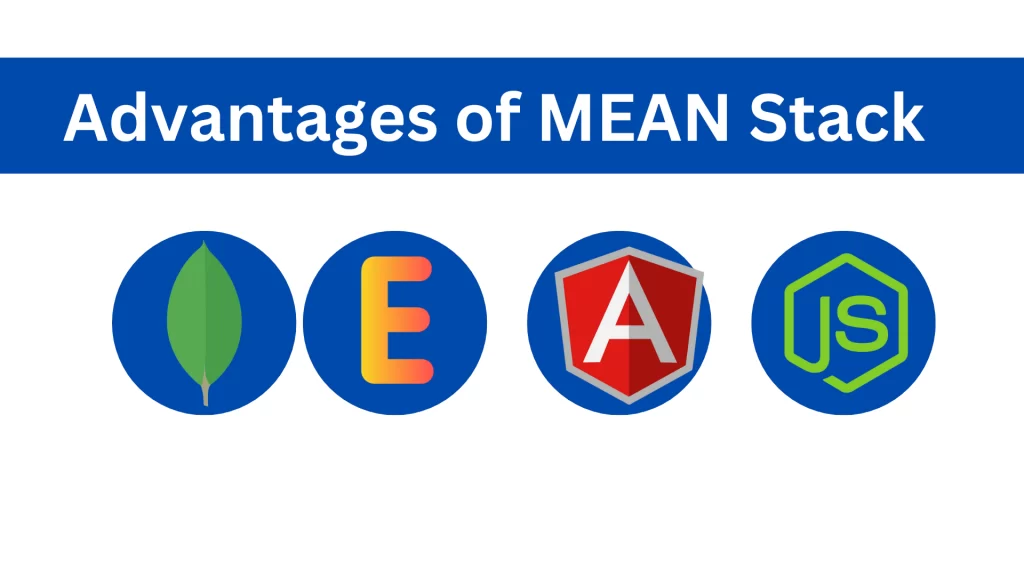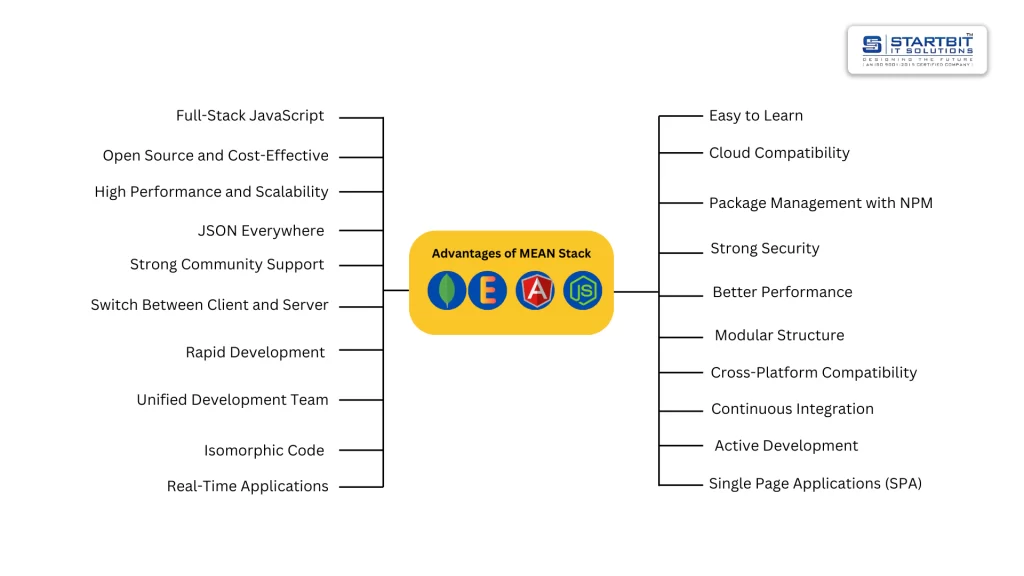
In today’s time, technology plays a major role in your web development: the right decisions and the right choices help you grow your business. One of the best technology and popular stacks is the MEAN stack. But why is it important? Let’s explore the benefits of the MEAN stack for development.
What is the Mean Stack?
The MEAN stack is a popular web development stack. This stack consists of four core technologies. MongoDB, Express.js, Angular, and Node.js. Each technology of the MEAN stack plays a specific role in the development process:
MongoDB: MongoDB is a NoSQL database and it uses a flexible, JSON-like document structure. It stores data in a way that makes it easy to manipulate and retrieve it using JavaScript.
Express.js: A web application framework for Node.js. It simplifies the process of building robust and scalable web applications by providing a range of features for web and mobile applications.
Angular: A front-end web framework developed by Google. It allows developers to build dynamic single-page applications (SPAs) with a rich user experience. Angular is known for its two-way data binding and dependency injection.
Node.js: A JavaScript runtime built on Chrome’s V8 JavaScript engine. It allows developers to execute JavaScript code on the server side, enabling the creation of fast and scalable network applications.

Advantages of Using MEAN Stack:
.
1. Full-Stack JavaScript:
Main Benefits of MEAN Stack Development. This development uses only JavaScript in both frontend and backend. This means that there is only one programming language to work on the entire project. This will make the project easier to manage and develop.
2. Open Source and Cost-Effective:
All the components of the MEAN stack are open-source and free to use. This means it is a cost-effective development. Also, it is free, so its support community is huge. So if there is any issue, resolve the problem easily. The open-source community always improves its technology. So it always ensures the latest features and updates.
3. High Performance and Scalability:
The core of the MEAN stack is Node.js, which is known for its high performance and scalability. It uses an event-driven, non-blocking model so that it is lightweight and efficient. This allows your application to handle a large number of simultaneous connections with high throughput.
4. JSON Everywhere:
JSON (JavaScript Object Notation) is used to exchange data in MongoDB, Node.js, and Angular. It helps to easily transfer and integrate different parts of the application. With JSON, you can easily transfer data from the server to the client and back, reducing the complexity of data handling.
5. Strong Community Support:
The MEAN stack is open source and free to use, so there is a large active community of developers. This means there are plenty of tutorials, resources, and forms related to the MEAN STACK that can help you with any problems you may face. Community support plays a huge role in any development because when you face a problem, you can easily find a solution with the support of the community. With its help, the development cost will be reduced to the maximum.
6. Easy to Switch Between Client and Server:
MEAN Stack works entirely on Javascript, so both the front end and back end can be easily managed. Hence developers easily find and resolve issues from the client side and development side.
7. Rapid Development and Prototyping:
The MEAN stack is known for enabling rapid development and prototyping. With reusable code and modular architecture, you can quickly build and deploy applications. This is especially beneficial for startups and businesses looking to bring their products to market quickly.
8. Unified Development Team:
The MEAN stack doesn’t require multiple developers, a single developer can easily manage the project for the frontend and backend. A good developer can easily manage JavaScript for the project reduce costs and improve collaboration.
9. Isomorphic Code:
The MEAN Stack allows isomorphic code, which means the same code runs on both the client and server side. This will help reduce time and speed up the development process.
10. Real-Time Applications:
Node.js, part of the MEAN stack, helps in building great real-time applications like chat apps and online gaming. Its event-driven architecture allows real-time updates and helps in a seamless user experience.
11. Easy to Learn:
Java Script is one of the most widely popular and easy-to-learn programming languages. Developers who know JavaScript will easily understand the MEAN stack development. So that they can reduce the learning time and speed up development.

12. Cloud Compatibility:
Mongo DB is part of the Mean Stack which is a great cloud service. It’s easy to set up, manage, and grow to your needs. MongoDB is easy to adjust and has a flexible design. MongoDB Atlas doesn’t have to worry about maintenance or backups – it’s all taken care of automatically. It works well with big cloud platforms like AWS, Google Cloud, and Azure.
14. Package Management with NPM:
Node.js comes with NPM (Node Package Manager), this NPM has thousands of free libraries and tools to use as needed and speed up work. For example, if you need a user login or a database connection, you can find a ready-made package. Using NPM saves time and helps you quickly build reliable apps.
15. Strong Security:
The MEAN stack uses MongoDB, Express.js, Angular, and Node.js technologies in the development process. Each technology has built-in security features.
- Express.js uses middleware to handle security issues such as preventing attacks from harmful scripts or fake requests.
- MongoDB keeps your data secure with tools for authentication (verifying users), authorization (controlling access), and encryption (protecting data).
- Angular protects against harmful code with built-in checking.
- Node.js supports secure coding and tools to find vulnerabilities. Together, these features make it easy to build secure and reliable applications.
16. Better Performance:
Angular makes it easy to keep data in sync, so any changes are reflected immediately. Node.Js handles multiple tasks at the same time without any delay. Making the server faster and more efficient. Together, they create web applications that run smoothly and respond quickly. And provide a great user experience.
17. Modular Structure:
MEAN Stack apps use a modular structure, which means breaking the app down into smaller parts. Each part – such as user logins, the database, or the frontend – can be developed and tested separately. This makes it easier to fix issues, update features, and keep the app organized. Modules can be reused and updated without affecting the whole app, making development faster and more efficient.
18. Cross-Platform Compatibility:
Node.js is designed for cross-platform compatibility which means the application runs seamlessly on Windows, Linux, and macOS. this type of developed app is compatible with all platforms and reaches out a larger audience across different environments. Whether you’re developing for desktops or servers, Node.js has you covered.
19. Continuous Integration and Deployment:
The MEAN stack integrates easily with Continuous Integration (CI) and Continuous Deployment (CD) pipelines. This integration automates testing, integration, and deployment processes, ensuring that updates and new features are delivered faster and more reliably.
20. Active Development Community:
The MEAN stack has a friendly and active community of developers. This means anyone can easily find help, share ideas, and collaborate with each other. The community will easily find a solution to any kind of problem.
21. Code Sharing and Collaboration:
Using a single language across the stack makes it easier for team members to share code and collaborate on projects. This leads to better teamwork and faster development cycles.
22. Single Page Applications (SPA):
Angular is excellent for building single-page applications that provide a seamless and fast user experience by loading content dynamically without refreshing the entire page.
23. Extensible and Customizable:
The MEAN stack is highly extensible and customizable. You can add new features and integrate third-party tools and libraries to meet the specific needs of your project.
Conclusion:
The MEAN stack stands out as a top-tier choice for web development due to its comprehensive JavaScript framework, high performance, and extensive community support. With its ability to handle projects of all sizes, from small initiatives to large enterprise applications, it’s a reliable option for creating robust and scalable web solutions. To leverage the full potential of the MEAN stack and ensure your project’s success, consider partnering with Startbit IT Solution. Our expertise in MEAN stack development can help you turn your vision into a reality with efficiency and excellence.


